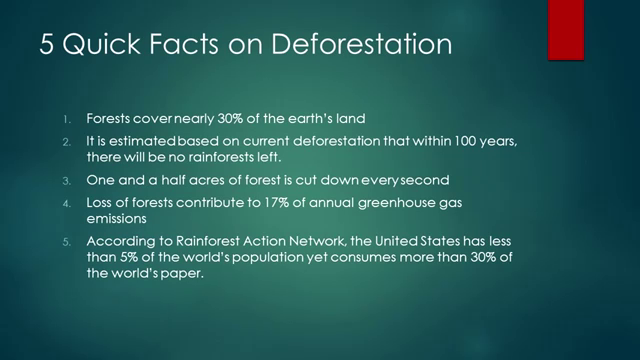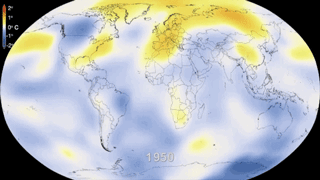DEFORESTATION & CLIMATE CHANGE A challenge to tackle!




Deforestation and Climate changes
What is happening to the world's forests?
It is difficult to accurately determine how much deforestation is going on worldwide due to the lack of satellite and radar data, along with unmonitored land-use change. However studies indicate that over the past 8,000 years, human activities have reduced the Earth's original forest cover by 20-50%. On top of this, studies by the UN's Food and Agricultural Organization show that the world's forests are being cleared at a rate of 0.3-0.8% per year, with over four-fifths of these losses taking place in the tropics.
The World Resources Institute estimates that if these rates continue, nearly 40% of the world's remaining forests will be logged or converted into other uses within 20 years.
Tropical deforestation
Figure 2. Removal of a forest in Rio de Janeiro, Brazil, for the use of clay.
Tropical forests cover around 6% of the Earth's land area, yet data suggests that in the past they covered more than twice that amount. Most of this deforestation happened since the 1950's, and occurs dominantly in Brazil, Africa, and Asia.
Brazil contains around 40% of the world's tropical rain forest, and sources say that without immediate action they may largely disappear within 40-50 years. A decent portion (12%) of Brazil's land area was once covered in the Atlantic coast rain forest, however most of it has been cleared, leaving a major loss in biodiversity - a small area the size of two suburban house lots contains up to 450 unique species!
Tropical deforestation is a major problem, not just because it covers such a vast area, but because of the abundance of life that relies on it. More than half of the world's species of plants and animals live in tropical rain forests, and the removal of these forests can wipe out species reliant on them.
Impacts
There are a vast quantity of negative impacts associated with deforestation. The most dramatic impact is the loss of habitat for countless species, as 70% of all land animals and plants live in forests.
Deforestation may also result in:
-
Decreased soil fertility from erosion
-
Disruption of ecosystem processes
-
Premature extinction of specialized species
-
Regional climate change from extensive clearing
-
Releases of carbon dioxide into the atmosphere from tree decay
Deforestation can also drive climate change - trees contribute largely to the hydrologic cycle, and the absence of trees, along with their decay, releases carbon into the global carbon cycle. Trees also play a large role in local temperature control, as portions of the forest canopy block the sun's rays during the day and keeps heat trapped at night. Removal of trees can cause temperature swings harmful to the plants and animals living there

Climate change
Atmospheric greenhouse gases (GHG's), such as carbon dioxide and methane, that come from the combustion of fossil fuels are changing the Earth's climate.[1] The world is warming, and there are many different phenomena that force the Earth's climate to become hotter or colder. While some of these are anthropogenic and some are natural (see here for a discussion of the difference), carbon dioxide released from pursuing energy services is by far the largest contributor to the planet's current changes in climate.[2]
There is no magic temperature that the Earth should be at, but as seen in figure 1, the climate is changing rapidly and this causes problems for all living things, including people. Some of the troubling aspects of climate change include:
-
An overall warming of the planet, referred to as global warming (a part of climate change).
-
A change in ocean chemistry called ocean acidification, that could lead to a major die-out of ocean life (which many people rely on for food).
-
An increase in extreme weather events, like heat waves, deep freezes, and very strong hurricanes.
-
Increased severity of floods and droughts because of changing precipitation patterns.
There are various signs indicating that climate change is already happening, and will continue to happen. In the Intergovernmental Panel on Climate Change's 2018 special report, it stated on average the Earth's temperature raises by 0.2°C every decade.[2] From pre-industrial levels, the special report states the Earth's average temperature has already increased by approximately 1.0°C. This report, written by 86 leading scientists from 39 countries, outlines how irreversible and unprecedented damage will occur when the Earth's average temperature raises by 1.5°C from pre-industrial times. If you are interested in checking out the full report, click here
GHG's mix in the atmosphere and travel around the world. This means that it is a global issue which will effect everyone, regardless if they are the source that emitted the GHG's or not. In contrast, something like air pollution, is more localized.
Humans use energy to maintain a high energy society that provides a good quality of life. As a result, the amount of energy that people use continues to increase to meet this high energy demand (see the pages on the BRIC and N11 countries for great examples of this). Unfortunately, most of the world's primary energy comes from fossil fuels, which is why climate change is so hard to stop.
There are lots of fossil fuels left. In fact, one of the biggest problems the world is facing today is that fossil fuels aren't going to run out! This has resulted in a lack of urgent need to find renewable and sustainable energy sources to replace fossil fuels. We have enough to continue burning these fuels for many decades to come, however, it will continue to induce problematic global warming, and climate change in general.
Governments will need to intervene to slow down the effects of climate change, however, individuals also make choices on their daily energy consumption as well. In the future, how climate change will affect the globe will depend both on how much and at what rate fossil fuels are burnt.
The more humans burn fossil fuels, and release carbon dioxide into the atmosphere, the more the negative effects of climate change will impact the world we live in.
References
Jelley., Dictionary of Energy Science: Oxford University Press
Intergovernmental Panel on Climate Change 2018 Special Report. 2018.
While these data are from NASA, this image was downloaded from http://bgr.com/2014/01/29/global-warming-gif-video/ on September 4th, 2015.
Error occurred: SQLSTATE[HY000] [1130] Host 'ip-72-167-208-235.ip.secureserver.net' is not allowed to connect to this MySQL server
* Sanitation & Hygiene
* Manipur State Govt. at a Glance
* Imphal West District at a Glance
* Imphal East District at a Glance
* Churachandpur District at a Glance
* BOSEM
* COSHEM




